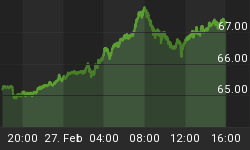This week, in a speech before the London School of Economics, Fed Chairman Ben Bernanke offered a perverse economic theory in his quest to gather support for never-ending Wall Street bailouts; "This disparate treatment, unappealing as it is, appears unavoidable. Our economic system is critically dependent on the free flow of credit, and the consequences for the broader economy of financial instability are thus powerful and quickly felt." In other words, credit is the lifeblood of our economy, and the continued operation of credit providers is an issue of national security.
In truth, not all economies run on credit. But over the last decade, the United States became a bubble economy that needed unlimited credit to keep from collapsing. In a legitimate economy, it is not credit that fuels spending and investment, but simply income and savings. It's too bad our Fed chairman does not understand the difference.
That American families now routinely rely on credit to make every-day purchases is a habit that needs to be broken and not encouraged. What we need in America is more restraint and less indulgence. For example, Americans in the current economy should not go into debt to buy new cars. Given the level of debt that weighs down the typical family, Americans should defer such purchases until they have paid down existing debt, or replenished their savings to the point where they can afford to pay cash. Until that time, Americans should continue driving their old cars. In the meantime, the untapped savings could be made available to local businesses that would use it to finance badly needed capital investments.
But such a drastic reversal in financial culture represents the kind of change that no one in the outgoing or incoming Administrations appears willing to consider. By providing perpetual support to lenders who have bankrupted themselves through bad loans, the government merely guarantees that bad economic behavior will continue.
Credit is indeed vital to an economy, but it does not constitute an economy within itself. The important thing to remember is that credit is scarce, and is limited by the stock of savings. Savings loaned to one individual is not available to be loaned to another until it is repaid. If it is never repaid, the savings are lost. Loans to consumers not only crowd out more productive loans that might have been made to business, but they have a far greater likelihood of ending in default. In addition, while business loans increase our capital stock and lead to greater productivity, loans made to consumers are merely spent, and do not create conditions that will make repayment easier. When businesses borrow to fund capital investments, the extra cash flows that result are used to repay the loans. When individuals borrow to spend, loans can only be repaid out of reduced future consumption.
One of the reasons we are in such dire straits is that consumers have already borrowed and spent too much. Many did so based on the false belief that ever-appreciating real estate would ultimately provide the means to repay their debts and finance their lifestyles. Now that reality has finally set in, why should the spending spree continue? The fact that a GDP comprised of 70 percent of consumption is currently contracting should not surprise anyone. In fact, such a contraction is long overdue and the government should not do anything to interfere.
In trying to perpetuate the illusion, the government wants to revive the spending spree that has led us to this disaster. But how can such actions possibly help? How will more debt improve the economy? Wouldn't our circumstances be vastly improved if we paid off some of our debts and replenished our savings? Wouldn't we be in better shape if instead of buying more stuff we concentrated on producing it?
The unpleasant reality is that years of bad monetary and fiscal policy have over encumbered our economy with debt and undermined our industrial capacity. The sooner we can begin to repair the damages, the sooner we can right the ship. If instead we merely administer more of the same, the ship will sink in a sea of inflation.
For a more in depth analysis of our financial problems and the inherent dangers they pose for the U.S. economy and U.S. dollar, read my just released book "The Little Book of Bull Moves in Bear Markets." Click here to order your copy now.
For an updated look at my investment strategy order a copy of my new book "Crash Proof: How to Profit from the Coming Economic Collapse." Click here to order a copy today.
More importantly, don't wait for reality to set in. Protect your wealth and preserve your purchasing power before it's too late. Discover the best way to buy gold at www.goldyoucanfold.com. Download my free Special Report, "The Powerful Case for Investing in Foreign Securities" at www.researchreportone.com. Subscribe to my free, on-line investment newsletter, "The Global Investor" at http://www.europac.net/newsletter/newsletter.asp.















